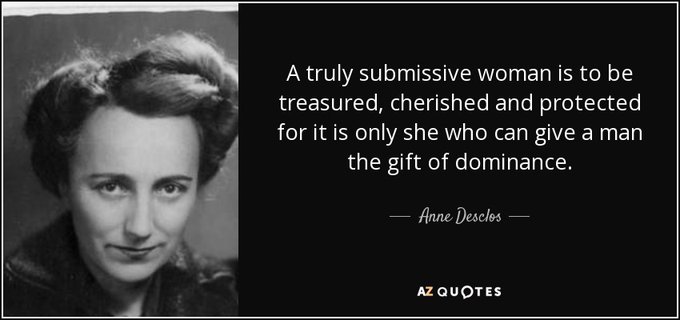Makow- How I Found My Masculine Identity
February 10, 2024

"It helps to see heterosexual love as a mystical dance. The male leads; the female follows."
Latest- On reflection, all my problems with women were because I lacked Self-confidence. I didn't know who I was or what I wanted. I suffered from arrested development. It wasn't until around 50, I solved the riddle. This article describes my awakening.
Heterosexuality is not based on "equality." It is based on unequal Power.
Masculinity is defined by Power. Femininity is defined by Love. Men want power. Women want love.
Heterosexual marriage is an exchange - female power for male power expressed as love.
A woman shows her love by entrusting her power to a man who has won her trust through courtship. This is feminine.
When men surrender power, they are emasculated.
This article, my first on the Internet 22 years ago, describes how I learned to follow my masculine instincts.

The male is dominant in a heterosexual relationship.
The Cabalists (Satanists) have neutered both sexes by teaching women
to seek power instead of love. They are tampering with the fundamental laws
of the universe (yin active-yang passive.)
Men are hardwired to love and protect women. Feminism has deprived women of the greatest treasure life has to offer.
By Henry Makow PhD
When I was 21 years old, and living in Israel, I received a letter from my mother. She had taken my savings and invested in a townhouse.
"Now, you are a mensch," she said.
I wondered what she meant. How did owning a house make me "a man?"
I came of age at a time when youth was "looking for an identity." I was searching for it in Israel. Later, I became a Canadian nationalist. In each case, I didn't find identity in "community."
I had a strong patriarchal father, an excellent role model. He built a successful career and supported a family.
"Find work you enjoy," he would tell me. "Work is the backbone of a man. It's the most important decision a man makes. A wife is the second."
But for some reason, his example didn't register. Why not?
For centuries, men defined themselves in terms of masculinity. Why was I so clueless?
I took my cues from the mass media. I was a feminist.
ATTACK ON GENDER AND FAMILY
I grew up in an era that bought the feminist lie - men and women are identical. In our culture, women are encouraged to be "equal" -- do everything men do, and vice versa. "Equal" became "identical." This retarded my personal development by 25 years. I doubt if I am alone.
"Identical" made me look for myself in a mate. I was literally attracted to lithe young women with cropped boyish haircuts: my own persona.

I put a woman on a pedestal because she had the key to my identity. She could give it back to me. Some women were immediately repelled. Others enjoyed the adulation for a while but eventually lost respect.
What I needed was someone quite different from me, my feminine complement.
Eventually, feminism will be recognized for what it is: a virulently anti-social, anti-women, lesbian ideology that achieved power by pretending to champion "women's rights." By taking power, feminism has been able to emasculate men and masculinize women. In other words, women have usurped the masculine identity, and in the process, both sexes have lost their own.
Incredibly, the destruction of heterosexuality is the hidden agenda of feminists, who think gender difference is the source of all injustice.
Most people don't realize that the feminist movement literally is Communist in origin. Most of the leading feminist thinkers, including Betty Friedan and Simone de Beauvoir, were Marxists, and many also were lesbians.
Feminism is about power, not a choice. "No women should be authorized to stay at home and raise her children," said feminist founder Simone de Beauvoir. "Women should not have that choice, because if there is such a choice, too many women will make that one" (Saturday Review, June 14, 1975).
If feminism were really about choices, it would not indoctrinate women to enter the workforce and become "independent." It would not demonize men and heterosexual love. It would not ostracize feminists who marry and start families.
Lesbians have always been women who coveted the male role. It is based on Marxist notions of "equality" and class conflict that have no relevance to a mystical and biological reality such as love.
The breakdown in the traditional family caused by feminism is the main reason for our social, personal and existential problems. People have always derived meaning and purpose from familial roles (e.g. daughter, wife, and mother) and from life-cycle rituals, (marriage, birth and death). Indeed, marriage and family are a God-given path to achieve love and personal fulfilment.
We do not find wholeness by incorporating masculine and feminine in ourselves but by uniting with our opposite. Heterosexual love is the attraction of opposites. Indeed, as heterosexuals, we define ourselves in terms of these differences. If we are male, we are not female, and vice-versa, like dark and light. Because I denied these differences, I didn't know who I was. I didn't understand women, and I didn't know how to approach them.

RECLAIMING MASCULINITY
I was almost 50-years-old before I solved the riddle. A book The Flight from Woman (1964) by Karl Stern, a Canadian psychiatrist, confirmed what my instincts were saying. My mother had been right all along. A man makes the house; the woman makes the home.
According to Stern, masculinity is defined by "power" over the natural and social environment. Men provide the physical and cultural context for the domestic world. They are do'ers: adventurers and builders, protectors and providers.
Femininity is defined by "love." Feminine psychology is founded on nurturing and loving husbands and children, and thereby being needed and loved. Women are the engines of love, acting much like the heart in the body. The family is the fundamental building block of society and foundry of the future. Women are its foundation.
Men define themselves by deeds; women simply are love: beauty, grace, faith and goodness. Men tend to be rational and objective; women subjective, intuitive and emotional. Distinctions like these need not constrict us. They are a theme upon which to play our own variations. For example, my wife mows the lawn; I do all the shopping and cooking. But without the theme, there is confusion and chaos.
The feminist gospel that traditional sex roles are "oppressive" is wrong. For many people, a flexible interpretation of traditional roles are essential for happiness and fulfilment.
I extrapolated from Karl Stern's distinctions. If man is motivated by power and woman by love, heterosexual love must be an exchange of the two.
A woman surrenders her power, in trust. This is how a woman expresses her love. By trusting. In this way, women actually empower men. If a man betrays this trust, he loses his power.
In return for her power, a woman gets what she really wants: a man's power expressed as his intense, undivided love.
He includes her in his sphere of self-interest: this is how two people become one. Her happiness is his happiness. He can't hurt her without hurting himself.
RECLAIMING FEMININITY
Teaching women to seek masculine power prevents them from getting what they really want. Women want to be possessed by a man's love.
God's love of Creation is mirrored in a man's love of a woman. A man channels God's love to a woman by making her a wife and mother. Women want masculine power, but it must be in a man.
A girlfriend once told me, "I want to be used." The same girlfriend also said that without a man, she feels "like a rudderless boat." Similarly, a man without a woman is a rudder without a boat.
A man cannot love a woman who is competing with him for power. Relationships between so-called "equals" are like mergers, or roommates.

Psychiatrist, Irene Claremont de Castillejo, calls them "brother-sister" marriages (Knowing Women: A Feminine Psychology, 1973).
They cannot achieve the intimacy as when a woman surrenders her will to a man, and a man returns this trust with his wholehearted love. Some psychiatrists say a woman's sexual satisfaction is also linked to her ability to trust and surrender.
Heterosexuality is not based on "equality." Women empower men by surrendering to them in exchange for love.
Femininity is based on the surrender of power for love. When men do it, they are emasculated.
Feminine women are creatures of God. In love, they sacrifice their "selves" for love, which in many religions is the key to transcendence. Helen Deutsch remarked on this"masochist-narcissist" syndrome (sacrifice for love) in her The Psychology of Women: A Psychoanalytic Interpretation (1944). The majority of women only achieve fulfilment as wives and mothers. In their hearts, they know it.
Nor can women love men with whom they compete. Women are hypergamous which means they seek men of higher status than themselves. Even the most ardent heterosexual feminist only can love someone more powerful than she.
The struggle for power is poisoning male-female relations. It is the death of love. Men cannot give up their defining characteristic (power) and expect to be men. Women cannot criticize and challenge men and expect to be loved.
When I comprehended this, I felt liberated. I established a healthy relationship with a woman who is my female complement and married her.
CONCLUSION
The universal complaint is that men don't know how to be men; women don't know how to be women. It helps to see heterosexual love as a mystical dance. The male leads; the female follows. You can't have a graceful dance without each partner playing his part.
The dance is based on love. The male is always considering his mate's wishes because he loves her. In some cases, he will ask her to lead.
He has no desire to stifle or frustrate her. He wants her to thrive because she is part of him.
As in a ballroom dance, who can say which role is more important? Both partners are of equal value. The dance requires both the leadership and dynamism of the male; and the beauty, love and grace of the female.
In the dance of love, two people become one, and the fruit of this mystical union is often a child.
--------
Related - 50 Real Difference Between Men and Women
First Comment from Zahra:
I am a young girl of fifteen in England and I am very glad to have come across your website. It is a very informative read. I especially enjoy your articles on feminism. What I like about your website compared to other websites is the fact you don't demonize women or reduce them to sex and beauty the way others do. I feel...safe reading your things. You really ought to sell your ideas to schools (if you don't get arrested though!). I am feeling conflicted; I want to study medicine when I'm older and find a cure for diseases but I also want to have children one day. Marriage won't be as much of a problem since I'd be getting an arranged marriage when I'm around twenty. I'm a second generation immigrant child whose parents spent their formative years in the UK so you'd have thought they'd at least understand the culture clash I'm going through. They don't but never mind. I was wondering what you might do in my situation.
Zahra
Do you have the option of having your family first and then training afterwards? If you do, that is the path I'd recommend.
Henry







R said (April 12, 2019):
Every time you re-post the above article, I read it with ostensibly a better understanding of the current dysfunctions dooming society and appreciation of the ever more difficult task of committing to a long-term healthy partnership, i.e. a marriage.
To be honest, I am no longer sure what type of woman is the realistic – if not ideal – fit for me. Faced by the breakneck pace of my everyday work life and the typically identical "feminist" traits and convictions that most women I casually meet – however rare the occasions are, indeed, due to the demanding nature of my work and its location – share, I am unable to answer these fundamental questions: should I get married just to establish some sort of formal social stability or just to procreate – or not at all if I don't meet my complementary "match"?
When I take a step back and look at the bigger scheme of things, I realize that I am hardly alone in this predicament. Still as a 38-year-old, I sometimes can’t help it but get trapped in a grueling struggle between my own preferences versus the all-too-obvious reality that societal norms are growing increasingly incompatible with them.
Yet continuing to try to "strive on with awareness", as Buddha once put it